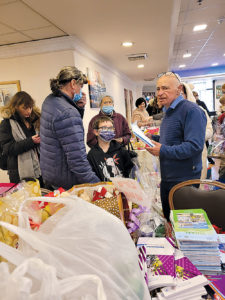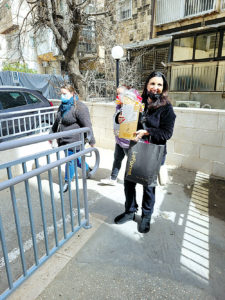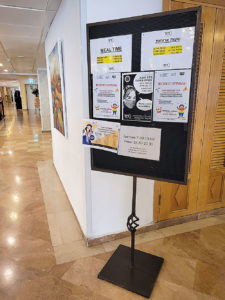By Fran Kritz
JERUSALEM – A ballroom at Jerusalem’s Caesar hotel on Jaffa Road was strikingly quiet, considering that it was Purim in the rest of the country and the day before Purim in the Holy City, which celebrates Purim later, according to tradition.
Ukrainian refugees staying at area hotels gathered at the Caesar, along with volunteers, professionals from the Immigration Ministry and government officials, including Fleur Hassan-Nahoum, Jerusalem’s deputy mayor. Volunteers, some of them Nahoum-Hassan’s neighbors and their kids, manned a table with mishloach manot, the traditional baskets of Purim sweet treats, and broke out their best smiles for the dozens of adults and children in the room.

Russian-speaking volunteers explained the paperwork in front of them, and the Ukrainians concentrated, tended to children and asked the first of what will be hundreds of questions in their new lives.
Just a few weeks into the arrivals of what will be thousands of newcomers from Ukraine, some order of what it will take to process immigrants and refugees is beginning to take shape. People arriving from Ukraine are being sent around the country to begin permanent or temporary stays. In Jerusalem they are housed, for now, at several area hotels, which have begun posting signs in Russian explaining meal hours and other directions.
Danielle Ginzberg, an Israeli who speaks fluent Russian (Russian and Ukrainian are similar enough to be understood by those arriving from Ukraine) and works nearby has been coming for hours every day to greet and help. “My boss is amazing, giving me time every day to help here,” Ginzberg said. “He says it’s also a way for him to help.”
The atmosphere in the room feels like a collective sigh. So much lost. So much not understood. This reporter decides to take in the scene but asks the official volunteers to share the stories instead of making people tell their story yet again.
“We’ve had every kind of individual and family arrive,” Ginzberg said. “A couple in their 80s, two daughters whose mother lives in Israel but never before intended to live here.”
In the corner, children are happily drawing with volunteers who don’t speak their language, but have a rainbow box of crayons. And hugs.

Caesar hotel, for now at least, is central command for would-be immigrants in Jerusalem, with staff explaining the process. Those in the Jerusalem hotels get daily breakfast and dinner, and money to buy lunch. But on a call the day before, Deputy Mayor Hassan-Nahoum wonders if the language barrier and food culture differences make it difficult for them, and she is hoping to be able to provide actual lunch food as well.
“They’re in a state of shock, yet need the basics like we all do, like an easy way to wash their clothes,” said the deputy mayor, who is working with the Jerusalem Foundation to raise and use funds to match immediate needs of those arriving from Ukraine.
Hassan-Nahoum is excited about good ideas that have been coming in, like a group of U.S.-born women who set up a pop-up shop near one of the hotels where refugees can “shop” (for free) for basic needs like clothes. Other items the volunteers and city hope to provide include laptops; most of the people coming from Ukraine left theirs behind.

The city is also arranging outings. On this particular day that trip is to the Jerusalem Zoo, led by volunteers. It’s a good choice. Ginzberg says that when she asked a boy what he missed most from home, he cried when he told her that they had to leave the family cat behind.
So, she sends another volunteer to a nearby pet store and explains that they need kittens. The store owner sends a dozen, no charge, and soon adults and children were stroking the cats “and even smiling,” said Ginzberg.
Answers to questions seem to be the most critical commodity here as individuals and families try to sort out what lies ahead.
“Imagine that you are a family in mid-conversion and now hoping to make aliyah,” said Rabbi Seth Farber, head of Itim, an organization that helps Israelis, particularly secular Israelis, navigate Jewish life in Israel such as conversion and marriage.
Those are among the questions Itim is helping with, “as well as just about anything else.” Farber says so far Itim has gotten close to 300 phone calls in just the last week. And Farber says he has been particularly struck by the good will and kindness of strangers.
“Documents for aliyah have to be translated into Hebrew, but often the people applying don’t know that, and don’t have the ability to do that,” he said.
In one case, though, a clerk, instead of handing the Ukrainian document back, called a friend that spoke the language, scanned the document and then accepted the translated Hebrew document back for the file needed for aliyah, Farber said.
Itim, based in Jerusalem, has four Russian-speaking staff members answering calls and helping refugees, as well as ads on Russian radio offering help to the newcomers.
Among the Israeli dignitaries stopping into the Caesar hotel to greet Ukrainians was Israel’s president, Isaac Herzog, and Pnina Tamano-Shata, Israel’s minister of immigration and absorption. Asked how she thinks Americans can help most, Tamano-Shata said, “Money. Because they are all going to need houses.”
Fran Kritz is a freelance writer. This originally ran in Washington Jewish Week.






